09 Aug NYSCASA Monthly Digest – August 2019
Do you have news for NYSCASA to share in our next digest? Email submissions with “Newsletter” in the subject line to Chelsea Miller, Communications Director, at cmiller@nyscasa.org.
Coalition News
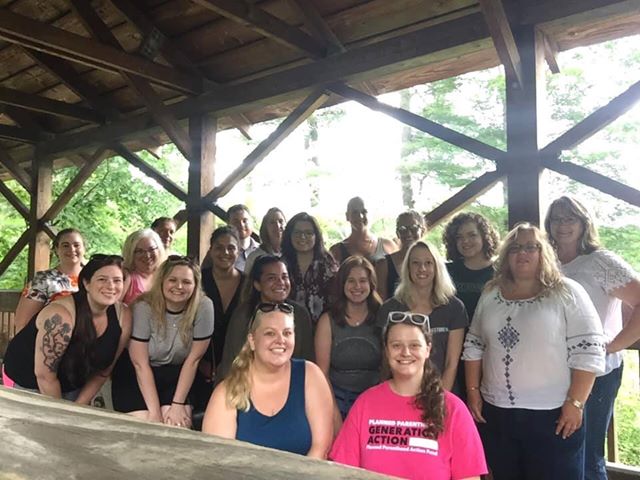
Advocates in Action: Campus Advocates of the Western NY Region
Campus Advocates from the Western Region enjoyed their meeting at Allegany State Park last month! The group gets together a few times a year to discuss how they can support each other, share their successes, and discuss plans for the upcoming academic year. Photographed are Campus Advocates from Crisis Services, Cattaraugus Community Action, Inc., RESTORE, Safe Harbors of the Finger Lakes, Inc., The Salvation Army Anew Center, and YWCA of the Niagara Frontier.
Would you like NYSCASA to highlight your advocates in action? Send photograph and text submissions to cmiller@nyscasa.org!
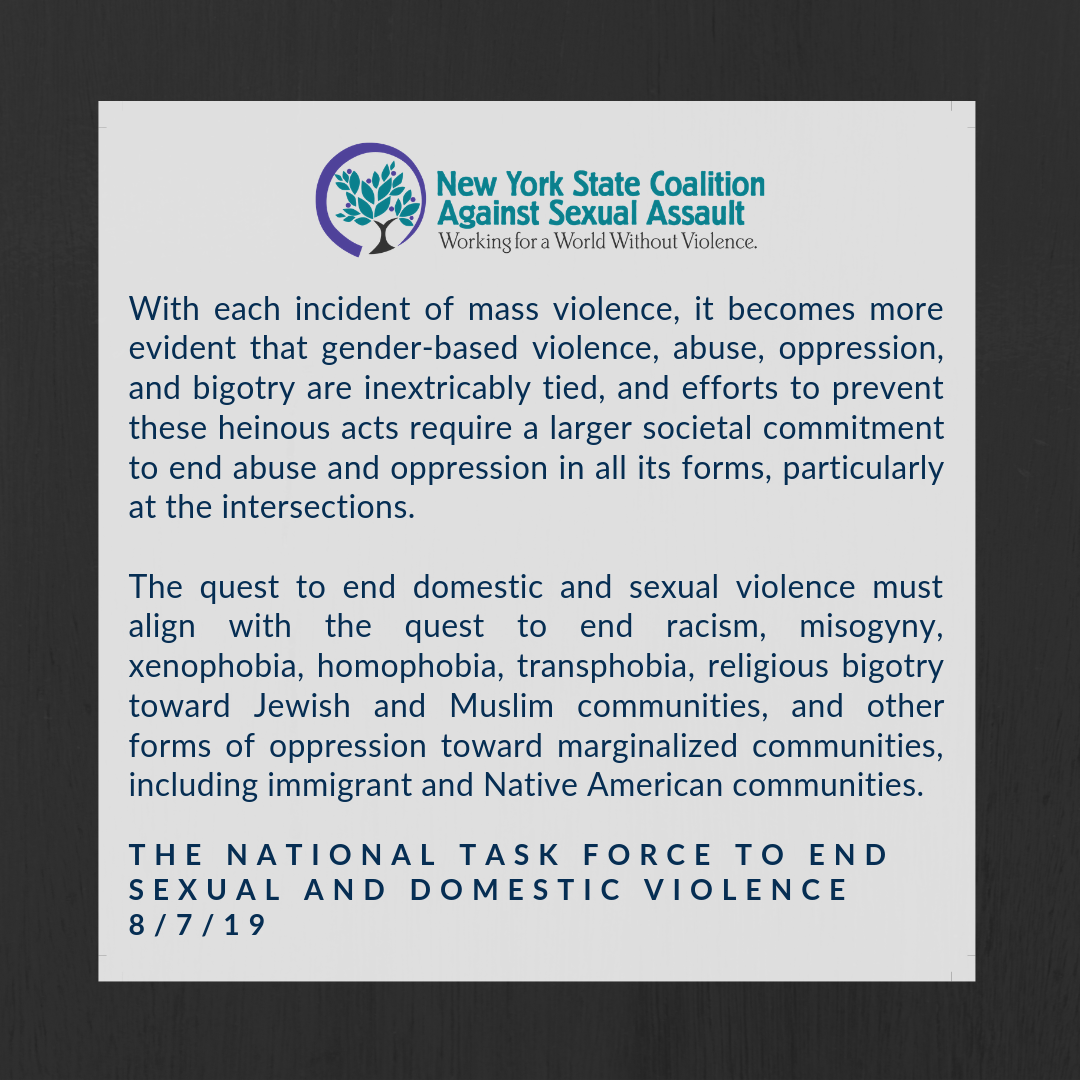 Anti-Sexual Violence Coalitions Nationwide Condemn the Mistreatment of Refugees and Immigrants Held in Detention
Anti-Sexual Violence Coalitions Nationwide Condemn the Mistreatment of Refugees and Immigrants Held in Detention
NYSCASA joins anti-sexual violence coalitions across the United States and territories in condemning the separation of children from family members as well as the violence and dehumanizing conditions faced by people being held in detention. Read our full statement here.
National Task Force to End Sexual and Domestic Violence Calls for Unified Efforts to End Racism, Abuse, and Oppression and Calls for Legislation to Curb Gun Violence
NYSCASA stands with the National Task Force to End Sexual and Domestic Violence in calling for bipartisan efforts to end racism, abuse, and oppression, and in calling for policy change to curb gun violence. Read the NTF’s full statement here.
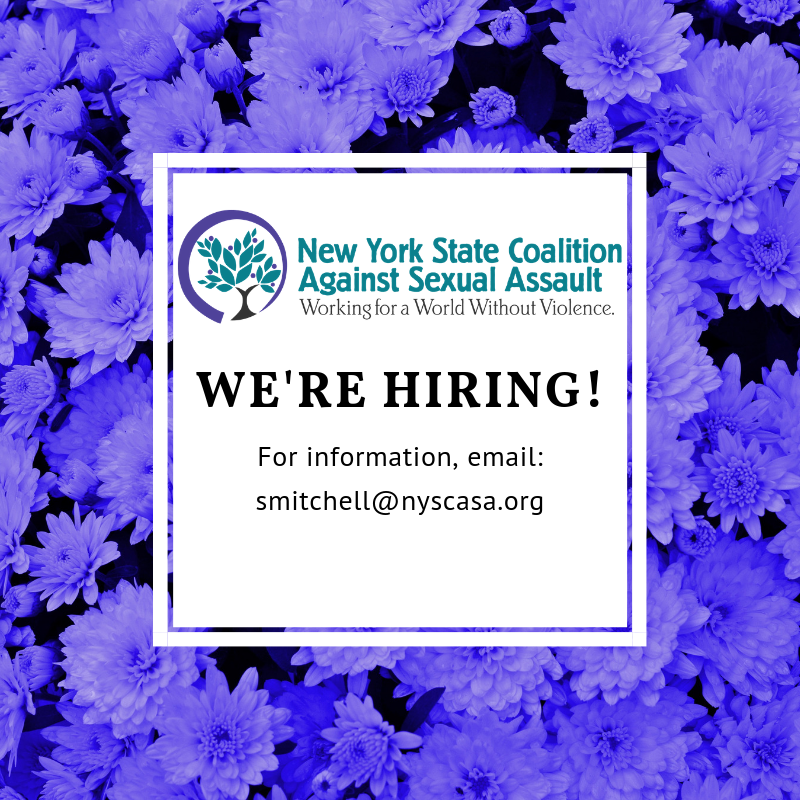 We’re Hiring!
We’re Hiring!
NYSCASA is currently hiring for two full-time positions at our Albany office:
To apply, please submit your cover letter and resume by email to Sam Mitchell at smitchell@nyscasa.org.
Coalition Events
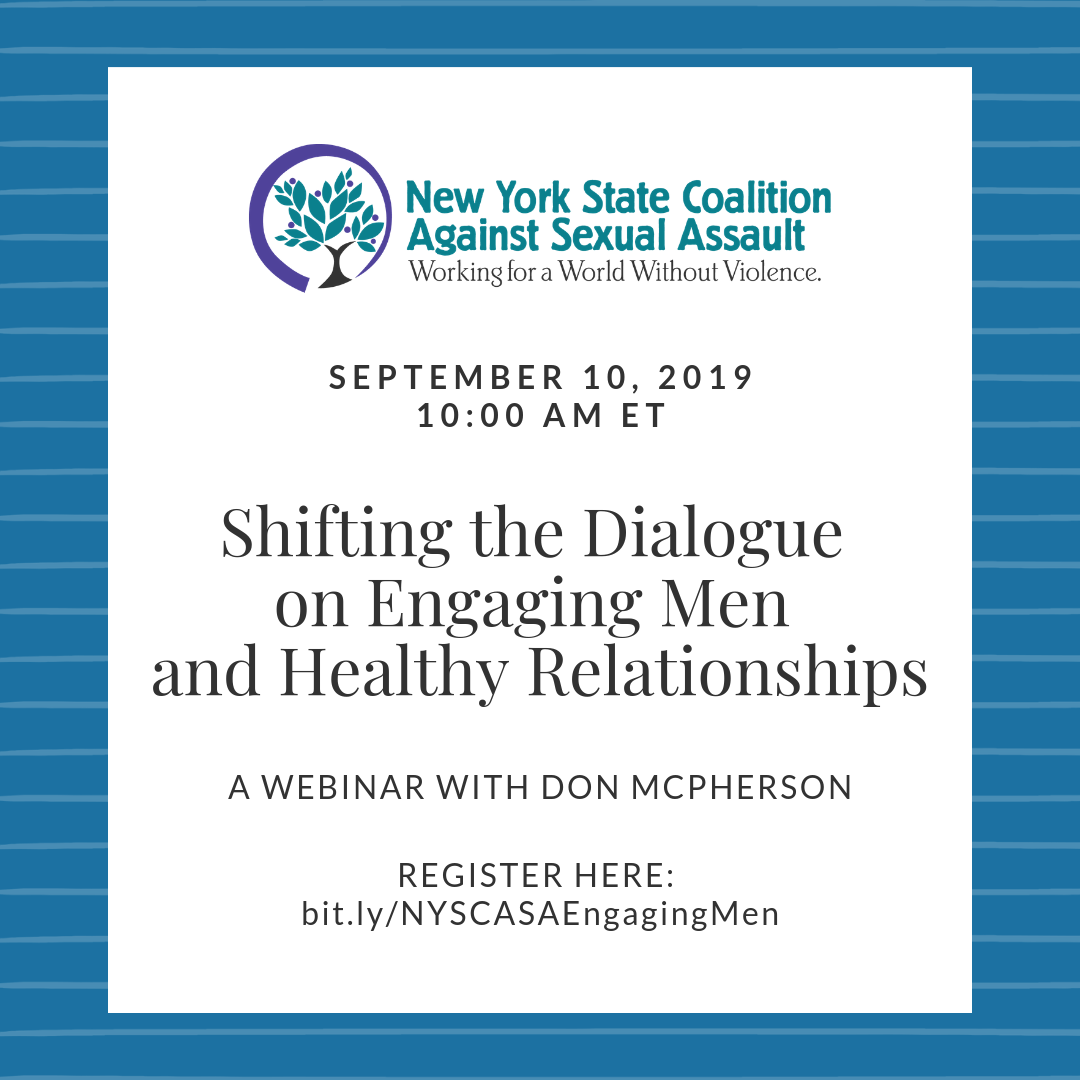 Webinar: Shifting the Dialogue on Engaging Men and Healthy Relationships (September 10)
Webinar: Shifting the Dialogue on Engaging Men and Healthy Relationships (September 10)
On September 10, join NYSCASA for a powerful webinar with Don McPherson, author of You Throw Like a Girl: The Blind Spot of Masculinity. This session will provide an overview of the state of the field of addressing sexual violence in higher education with a focus on engaging boys and men. The discussion will offer new perspectives on bystander behavior programs and education around “consent.” The goal of this session is provide strategies to build sustainable programming to engage men; taking this beyond prevention and toward healthy relationships and aspirational masculinity. Register here.
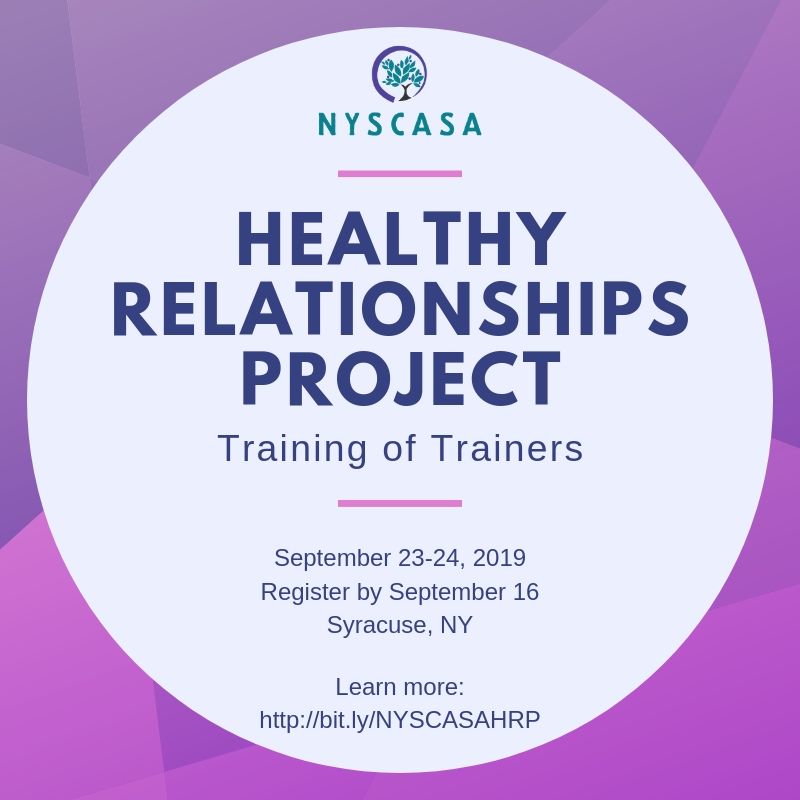 Training of Trainers: Healthy Relationships Project (September 23–24)
Training of Trainers: Healthy Relationships Project (September 23–24)
This fall, NYSCASA is offering its rape crisis programs and its Ally Organization members one more opportunity to become trainers of Prevent Child Abuse Vermont’s (PCAVT) Healthy Relationship Project. Becoming a trained trainer in PCAVT’s Healthy Relationships Project will prepare you to facilitate PCAVT’s comprehensive child sexual abuse prevention programs – Healthy Relationships Project – and to teach others to facilitate the programs with fidelity. Learn more here.
Note: This training is available only to NYSCASA’s rape crisis programs and Ally Organization members.
Click here to purchase an annual NYSCASA Ally Organization membership if your organization is not a current member and you would like access to register for this training.
The training will be held September 23-24, 2019, in Syracuse, NY. The deadline to register for this training is September 16. Read more and register here.
If you have questions or concerns, please contact Sarah Podber, Prevention Director, at spodber@nyscasa.org.
2020 Sexual Assault Prevention and Intervention Conference
NYSCASA is thrilled to announce that we are co-creating a conference to be held in June 2020 with Seven Dancers Coalition, the Indigenous anti-violence coalition in New York State and Haudenosaunee Country, and Interrupting Criminalization: Research in Action, an initiative of the Barnard Center for Research on Women Social Justice Institute. This collaboration, and related programming, will establish a bridge between mainstream and community-based efforts to end gender-based violence and interpersonal violence while also resisting state violence.
The 2020 Sexual Assault Prevention and Intervention Conference will be held on June 4–6, 2020. Location, speakers, and additional details to be announced. Pre-conference programming will be announced in the coming months.
Conference participants will:
- Learn about community-based alternatives to the criminal legal system to effectively support all survivors of sexual violence
- Acquire an in-depth understanding about restorative justice, Indigenous peacemaking, transformative justice, and community accountability frameworks through concrete examples of community-based approaches to violence intervention
- Build skills in using community-based practices in the context of sexual violence prevention and intervention
- Develop the knowledge and skills to nourish and sustain communities that can prevent sexual violence, respond to harm, and heal trauma
Sign up to receive updates about the 2020 conference here: bit.ly/NYSCASA2020
For information about additional upcoming events, be sure to check NYSCASA’s calendar!
Policy and Legislative News
Child Victims Act: One-Year “Window” Opens on August 14
The Child Victims Act created a one-year “window,” when any adult survivor of child sexual abuse can file a civil lawsuit against the person or institution who harmed them, no matter how long ago the abuse took place. This includes survivors who never before brought a case and survivors who filed cases but couldn’t move forward because the statute of limitations had expired.
The window will go into effect on August 14, 2019. The window lasts through August 13, 2020. Suits must be filed during that window, but they don’t need to be resolved during that window.
Safe Horizon has created resources to help guide adult survivors of child sexual abuse through the process:
- What Is the Child Victims Act?
- CVA Frequently Asked Questions
- I Was Abused: Is Legal Action Right For Me?
- What to Consider When Picking a Lawyer to File a Child Abuse Case
For additional resources relating to the Child Victims Act, please visit our website.
Confidentiality Program for Survivors of Sexual Violence, Stalking, and Human Trafficking
On August 1, Governor Andrew Cuomo signed legislation (S.5444/A.7515) allowing victims of sexual offenses, stalking, and human trafficking to participate in the Department of State’s Address Confidentiality Program. The program allows victims to keep their address hidden from their perpetrators by using a substitute address provided by the Department of State in lieu of their actual home, school or work address. The bill will take effect 90 days after becoming law. Read more.
Creating a Maternal Mortality Review Board
On August 1, Governor Cuomo signed legislation (S.1819/A.3276) to create a Maternal Mortality Review Board charged with reviewing the cause of each maternal death in New York State and making recommendations to the Department of Health on strategies for preventing future deaths and improving overall health outcomes. Read more.
Expanding Protections for Victims of Domestic Violence
On August 8, Governor Cuomo signed three pieces of legislation expanding protections for victims of domestic violence. These measures broaden the definition of the crime of domestic violence to include forms of economic abuse such as identity theft, grand larceny, and coercion (S.2625/ A.5608); give victims the choice to vote by mail-in ballot, even if they remain within the county where they are registered to vote (S.3232-A/A.219); and allow victims to report abuse to any law enforcement agency in New York State, regardless of where the violence originally took place (S.1243/A.4467A). Read more.
New and Noteworthy Resources
New Article: “Invisible Bruises: Theoretical and Practical Considerations for Black/Afro-Latina Survivors of Childhood Sexual Abuse”
A new article, co-written by Delida Sanchez, Luz Márquez Benbow, Martha Hernández-Martínez, and Josephine V. Serrata, focuses on the intersectionality of race, gender, and violence in the lives of Black/Afro-Latinas who have experienced childhood sexual abuse. First, the authors discuss the trauma of slavery, racism, and colonization in Latin America and the Caribbean, which objectifies Black bodies and renders Blackness invisible. Second, the authors identify institutional and interpersonal barriers to seeking trauma support. Third, they preliminary findings from a Listening Circle among survivors who participated in the Black Latinidad: Building Siblinghood to End Child Sexual Abuse Project. Finally, Sanchez et al. propose a racially and culturally specific, trauma-informed approach that draws on the strengths of survivors and centralizes their voices and how to intervene. Read more.
NSVRC Blog Series: “Putting it into Practice: Diversity and Inclusion in Prevention”
The National Sexual Violence Resource Center’s new series, Putting it into Practice: Diversity and Inclusion in Prevention, highlights the work that folks are doing to prioritize diversity, inclusivity, and anti-oppression work in their prevention efforts.
- Sexual Violence and Oppression: Framing Our Work Using the Sexual Violence Continuum (Mo Lewis)
- A Movement Within a Movement (Diana Mancera)
- How North Carolina Prioritizes Diversity and Inclusion Across the State (Glorina Stallworth and Molly Marcotte)
- “We Can” Project: Incorporating Intellectual and Developmental Disabilities Communities into Prevention (Joanna Dragan)
- The Role of Language Access in Violence Prevention Efforts (Virginia Perez-Ortega)
- Why Our Community-Level Prevention Efforts Must Be Inclusive (Mo Lewis)
The Tribal Resource Tool
American Indian and Alaska Native (AI/AN) communities experience disproportionate rates of sexual violence. According to the National Institute of Justice, more than half of AI/AN women and more than one in four AI/AN men have experienced any type of sexual violence in their lifetime. While Native women are more likely than white non-Native victims to need services, they are significantly less likely to receive those services. The Tribal Resource Tool is one solution working to connect Native victims of crime and abuse with the services and resources they need. Office for Victims of Crime (OVC) funded this project, which is part of the Vision 21: Transforming Victim Services Initiative. Learn more.
“As One Door Closes”: Looking Back on SADI After 10 Years
You might have noticed that NYSCASA has been sharing publications and resources created as a result of the Sexual Assault Demonstration Initiative (SADI), the first large-scale project to address the challenges that dual/multi-service programs face in reaching and supporting sexual assault survivors.
Over the past ten years, the SADI project has continued to ask dual/multi-service programs to be critically self-reflective about the ways in which their programs and service models are structured in order to enhance comprehensive services for sexual assault survivors. Taylor Teichman shares lessons learned from the SADI project, as well as resources available for dual/multi-service programs.
New Resources for Transformative Justice and Community Accountability
In a new blog post, INCITE! shares several exciting new resources that have emerged that help build practices and strategies for Transformative Justice and Community Accountability.
- TransformHarm.org is a resource hub about ending violence. It offers an introduction to transformative justice. Created by Mariame Kaba and designed by Joseph Lublink, the site includes selected articles, audio-visual resources, curricula, and more.
- What Really Makes Us Safe?gathers several voices and hears what they each have to say about the same general questions: What is a community after all? How do we get people to change? Where is the movement headed? Created by Melanie Brazzell.
- Fumbling Towards Repair, a workbook by Mariame Kaba and Shira Hassan, includes reflection questions, skill assessments, facilitation tips, helpful definitions, activities, and hard-learned lessons intended to support people who have taken on the coordination and facilitation of formal community accountability processes to address interpersonal harm & violence.
- Videos from the April 2019 Building Accountable Communities National Gathering. Organized by Mariame Kaba, this convening included adrienne maree brown, Leah Lakshmi Piepzna Samarasinha, Ann Russo, Amita Swahdin, Shira Hassan, Mimi Kim, and other leading anti-violence organizers.
Job Opportunities
- Campus Projects Director – New York State Coalition Against Sexual Assault (Albany, NY)
- Grants Compliance Director – New York State Coalition Against Sexual Assault (Albany, NY)
- Legal Director – The Legal Project (Albany, NY)
- Hub Coordinator – New York City Transformative Justice Hub (New York, NY)
- Restorative Justice Coordinator – Make the Road New York (Brooklyn, NY)
- Multiple positions – Advocacy Center of Tompkins County (Ithaca, NY)
- Multiple positions – Anti-Violence Project (New York, NY)
- Multiple positions – Center for Safety and Change (New City, NY)
- Multiple positions – Empire Justice Center (Rochester, NY)
- Multiple positions – Family Services, Inc. (Poughkeepsie and Kingston, NY)
- Multiple positions – Jane Doe Inc. (Boston, MA)
- Multiple positions – Sanctuary for Families (New York, NY)
- Multiple positions – The Safe Center LI (Bethpage, NY)
- Multiple positions – Vera House, Inc.
- Multiple positions – VIP Mujeres (New York, NY)
- Multiple positions – Wellspring (Saratoga Springs, NY)
- Multiple positions – YWCA Northeastern NY (Schenectady, NY)

